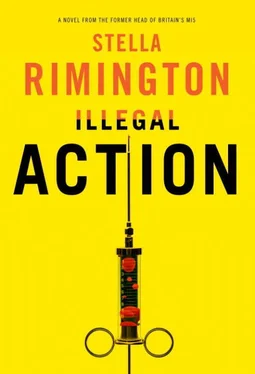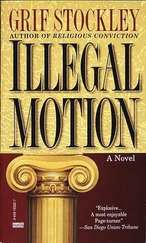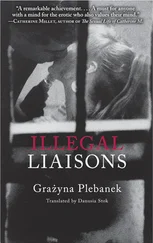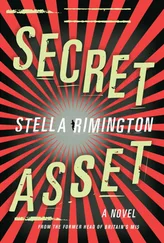Now he said to the man, “When I left the hotel I told Andrei that I was finished working for you guys.”
Vladimir shrugged. “Of course you did. But situations change, don’t they?”
Not for me, thought Jerry. When he had left the army he’d been delighted to find the security job at the Dorchester. Sure the money wasn’t terrific, but it was a famous hotel, superbly run, and he’d been well treated. The only injury he’d suffered in his time there had been a bruised knee when he’d slipped on a freshly mopped bathroom floor. It certainly beat four-man night patrols in southern Afghanistan.
His problem had been Carly, wife number three. Now divorced. Three in chronological order, that is, but number one for greed. So it had been a blessing when Andrei had turned up. The job had been a doddle. Just tittle-tattle, names and addresses, comings and goings at the hotel, what the occasional sheikh got up to (gambling, usually, and girls; sometimes gambling and boys). It had been money for jam, even if Carly got most of it.
He’d had a pretty good idea who Andrei was. Organised crime he’d thought at first, but he’d recognised a certain military touch—official, he’d decided. Jerry had never had the slightest fear he was doing anything that might harm Britain. Though by the time he had left the employ of the hotel, lured by a security firm with the promise of better pay and better hours, he was relieved to put his days moonlighting for Andrei behind him.
“I’m not at the Dorchester any more,” Jerry said, trying to sound conclusive, though he was not so naïve as to think Vladimir didn’t know this already.
“I know. Congratulations. You’re working for a very wealthy man.”
Jerry shrugged. He’d never heard of his present employer until he’d become his “driver”—which meant his bodyguard behind the wheel. “Maybe he is,” he said. “I just take him where he wants to go and look after him. That’s all I know.”
“You know more than you think,” said Vladimir.
“What do you mean?” said Jerry. His heart was starting to sink. Vladimir didn’t seem edgy any longer.
“Your new employer is a countryman of mine. I’m very interested in him.”
They sat in silence for a moment. The wind had picked up again, and Jerry stirred uneasily on the bench, feeling cold. Why did I have to get a job with a Russian? he wondered sourly as he waited in vain for Vladimir to break the silence.
At last Jerry sighed. “What are you looking for?” he asked quietly, trying to make it clear he hadn’t agreed to do anything.
“Same as the Dorchester,” said the man on the bench. “And this time there’s only one ‘guest’ to keep an eye on.”
“But this guy doesn’t get up to anything,” Jerry protested. “He doesn’t do nightclubs, doesn’t even go out much to restaurants. A new girlfriend’s around, and he spends most of his spare time with her. Their idea of a big night is ordering a takeaway and watching a DVD.”
Vladimir shook his head knowingly. “But people come to see him on business; sometimes he goes to see people. In his large chauffeur-driven Bentley automobile,” he added pointedly.
Jerry sensed he had already given away too much ground. He looked out at the slope below them, where a man in a green anorak was walking a large frisky Doberman through a patch of yellowed grass. “Most of the people he sees are Russians. I can’t tell one name from another. And I can’t understand a word they say.”
Vladimir snorted. “We’re not asking you for transcripts,” he said caustically.
“What do you want to know?” Jerry demanded. “I’m not a traitor, you know.”
Vladimir did not answer him directly, but said, “It’s a purely Russian affair. Nothing to do with the queen.” Vladimir waved his hand expansively.
Jerry shook his head. “But what if I won’t play ball?”
An expression Vladimir must have been familiar with, for he said, “That is your choice.” He paused, and his eyes were cold slits as he stared at Jerry. “As it would be ours to discuss your former activities on our behalf with the firm that placed you in your post.”
I should have seen this coming, thought Jerry, way back when he’d first met Andrei, that evening in the Dorchester, when the Russian said he was locked out of his room and Jerry had been sent up to let him in again. Andrei had given him a bottle of champagne from the minibar as thanks, which Jerry—strictly against the rules—had accepted, hiding it in his locker deep in the bowels of the hotel.
Then the next night he had bumped into Andrei in the pub on South Audley Street where Jerry liked to unwind after working hours. And on the night after that. They’d become friends, which meant Andrei paid for all the drinks, the odd meal they’d had together, once even for a girl. When Andrei had made his offer of a cash retainer in return for information that was not much more than hotel staff gossip, it seemed a natural extension of his generosity.
Yet now, three years later, it was coming home to roost. “Of course you must decide,” said the Russian Vladimir, with apparent indifference and no pretence of friendly persuasion.
Jerry considered his options. There weren’t any. Brigadier Cartwright wouldn’t give him five minutes to clear his desk if he discovered he’d been taking cash on the side—even if it had been before Jerry joined the firm. Particularly when he discovered it was cash from a foreign government. With a black mark from the brigadier, Jerry would never find a cushy job again. He’d enter middle age reduced to being cheap hired “muscle.” As a bouncer in a nightclub if he was lucky. More likely in a pub somewhere, throwing out the drunks.
“Okay,” he said at last, reluctantly. “But the money had better be good.”
“Meet me here again in a week,” declared Vladimir. “The same time. I will give you your orders then.”
“And the first payment,” said Jerry trying to extract some small satisfaction.
Liz pulled the duvet up to her chin, stretched out her legs and reached out to switch on the eight o’clock news. She briefly wondered whether to get up and make a cup of coffee, and just as quickly decided against it. In all the years she had worked with Charles in Counter-Terrorism, she had never really relaxed, even on a Saturday morning. Counter-Terrorism operations came up suddenly out of the blue and needed a fast response. She was usually home late, often away from home altogether, but the sudden excitement, the tension, were what she had loved about the job.
Admittedly her private life had become a mess. Her small flat in Kentish Town, once much loved, had become dowdy. Things broke down and she never had time to fix them; the tide of muddle had advanced inexorably. In the four months since she’d moved to Counter-Espionage everything had changed. The job wasn’t without interest, but the pace was slower, more nine to five.
She had used her unaccustomed spare time to get her life in order. The peeling wallpaper in the bathroom had been replaced with tiles. The whole flat had been repainted and a smart new stainless steel washer-dryer had replaced the stuttering old thing she had inherited when she bought the flat. The goose-down duvet she was cuddling was bought on a whim, but was the most satisfactory of all her improvements.
Now from the comfort of her bed, she contemplated the elegant new bedroom curtains and the uncluttered carpet and thought about the weekend ahead.
Most of it would be spent with Piet. He was Dutch, an investment banker with Lehman’s in Amsterdam. Every third Friday he came to London for a meeting in Canary Wharf and he would stay in London for the weekend. Friday night he went out to dinner with his colleagues but at lunchtime on Saturday he would appear at the basement door in Kentish Town, clutching champagne or a bottle of perfume he had bought on his way through the airport, and he and Liz would spend the rest of the weekend together. This was an arrangement which suited them both perfectly. It was warm and happy and undemanding.
Читать дальше












